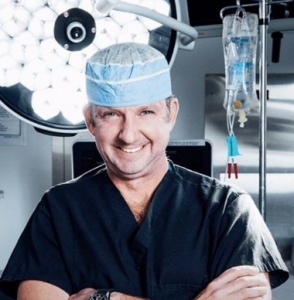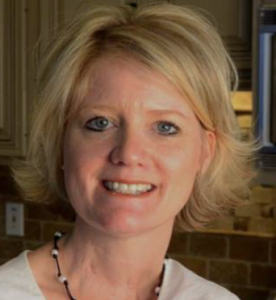By Stephanie Zimmerman, RN, MSN
Dear Healthcare Providers,
Although professionally, I am a former pediatric oncology nurse practitioner, I write this letter as an individual who lives with the long-lasting impact of late effects stemming from the successful treatment of Ewing’s Sarcoma as a child in the late 1970’s.

Part of my excellent healthcare team: Gonzalo Gonzalez, MD Chief of Heart Transplantation and Mechanical Circulatory Support at Baylor University Medical Center in Dallas, TX
I write because I am fortunate to be surrounded by a healthcare team comprised of individual providers who have partnered with me to optimize my health and wellbeing; providers whom I trust and respect as experts in their respective fields and who trust and respect me as an expert in me; providers who hear me because they choose to listen; providers who don’t take my questions as a professional affront, but as an opportunity; providers who acknowledge their limits and know their resources; providers who are invested in me.
I write because my healthcare experience has been for the most part exceptional, and I want others facing similar health circumstances to have what I have worked hard to cultivate among my team.
I write because I find myself wondering if that is even possible given the all too common divide that can develop within the provider-patient relationship and the seeming unwillingness of both parties to listen one to the other.
I write because of tragedies like the death of Jess Jacobs at the hands of a “not my problem” mentality found within medical education, and sadly, medicine at large. Lest we think Jess’ case is an isolated incident, consider with me Paul Kalanithi, renowned neurosurgeon and author of When Breath Becomes Air, who wrote of an encounter with a resident in the final stages of his lung cancer,
“I could see in Brad’s eyes I was not a patient, I was a problem: a box to be checked off; an obligation to me meant adding another thing to his to do list.”
Trust me, if it’s happening to the strongest of self-advocates like Jacobs and Kalanithi, it’s a systemic problem.
I write to give voice to the concerns of individuals living the daily reality of chronic illnesses, visible and invisible; realities that are different, but nevertheless, real; individuals who have chosen whether by choice or necessity to educate and equip themselves such that they are capable of, indeed committed to sharing in the making of decisions that impact their health and wellbeing; individuals who all too often are held in such low esteem that their voices go unheard, their concerns invalidated, and their needs unmet; individuals who you view as problems, but not yours.
I write because not every patient seeks to manipulate you, the system, but every patient seeks to be heard and responded to in a respectful manner and an equally respectful tone of voice.
I write because the utmost desire of most patients is to work with their providers, to forge collaborative partnerships within the context of a relationship characterized by trust, mutual respect, and a commitment to their best interest.
I write to declare that chronic risks and conditions are a part of who a person is, but they are not the totality of who they are, to declare that chronic conditions are inherently challenging, yet also to declare that chronic conditions can be handled well across time when compassion and long-suffering are brought to bear upon the circumstance.
I write because we want to maximize our health and minimize the impact of our illness.
I write because we are seeking to be responsible regarding our illnesses and just as you seek to hold us accountable for compliance with recommended treatments, you should expect us to hold you accountable in relationship to the way you deliver our care.
I write because I bring years of experience, of wisdom to the table of my own care; experience and wisdom that deserves a listening ear and a compassionate heart when I present to your office with a concern, a need.
I write because what you consider chronic complaints or signs of weakness are in fact valid concerns and likely points of great frustration and discouragement to us, the patients. If only you could permit yourself to consider what it might be like to walk the proverbial mile in our shoes, then you might taste a little of the salt in our tears.
I write because there are times that we don’t speak up for fear of being dismissed at best, or labeled difficult and blackballed at worst.
I write because we have been made to feel small, reduced, even mocked in the hallways by you, the providers charged with our care when in fact we are worthy of your respect 24/7/365.
I write because we will not be silenced; we will be relentless in our pursuit of the highest caliber of care appropriate to the clinical scenario at any given point in time.
I write because the reality is that we need you in our lives. Sadly, we are expendable to you.
I write to remind you that we are more alike than we are different; you could become someone like us in the blink of an eye as chronic illness does not discriminate.
Paul Kalanithi wrote,
“Before operating on a patient’s brain, I realized, I must first understand his mind: his identity, his values, what makes his life worth living, and what devastation makes it reasonable to let that life end. The cost of my dedication to succeed was high, and the ineluctable failures brought me nearly unbearable guilt. Those burdens are what makes medicine holy and wholly impossible in taking up another’s cross, one must sometimes get crushed by its weight.”
I write to assure you that we are not asking you to solely bear the burden of our illnesses rather we are asking you to shoulder the weight of [it] alongside of us rather than across from us, despite of us, or even worse looking down upon us.
I write because we are your patients not your problems.
Respectfully,
Stephanie D. Zimmerman

Stephanie Zimmerman, RN, MSN is a speaker, writer and activist focusing on late effects of treatment of cancers. She has been featured in After Cancer Treatment: Living Out The Cure; The Gift of Organ Donation: Honoring Donors and Their Families; contributed to How Do I Advocate For Myself and What Happens When A Calling Becomes a Job and provided the guest post Creating a Multidisciplinary Dream Team.







Thank you Stephanie!
Thank you so much for writing this wonderful article.
Kudos to you for hitting the proverbial nail on the head! Thank you for your well-written assessment and call to action. True listening comes from the heart–as should patient care.
Thats brill you should send it to Hammersmith renal transplant unit then they might finally understand the patient.
Thanks a lot to share this article with us. Feeling wonderful while reading it.
Looking for your another good post in future !!
Thank you so much for writing this… I struggled through 9 months of advocacy for a family member to get them the care they needed and the right to be taken care of, the right to be heard. The damage inflicted by this experience has taken an emotional and psychological toll. Patients and their family members, caregivers and patient advocates should not emerge traumatized from their medical experiences. This is completely unacceptable. Care, compassion, and empathy must come back to the center of healthcare and be the top priority for those who choose to serve in the medical field. If one is incapable of this, one should not be practicing medicine. Entering this field is for the benefit of others, not oneself. This needs to be immensely emphasized for the betterment of our healthcare industry. Please keep speaking out, as there is no alternative to excellence in medicine.
I will forward your post to help inform all of us.
Thankyou for a well written heart felt
message.
Thank you for such wisdom, truth and compassion.
I am following your blog regularly and got great information.
This is really helpful information. I will surely share this with my people so that this can spread fast. Everyone must read this.